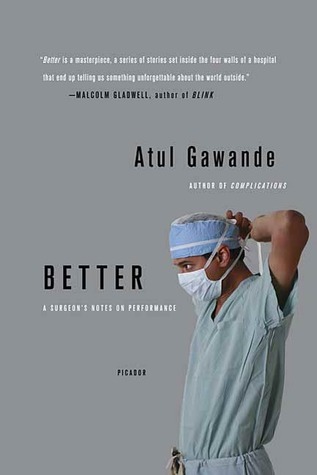More on this book
Community
Kindle Notes & Highlights
As a doctor, you go into this work thinking it is all a matter of canny diagnosis, technical prowess, and some ability to empathize with people. But it is not, you soon find out. In medicine, as in any profession, we must grapple with systems, resources, circumstances, people—and our own shortcomings, as well. We face obstacles of seemingly unending variety. Yet somehow we must advance, we must refine, we must improve.
The world is chaotic, disorganized, and vexing, and medicine is nowhere spared that reality. To complicate matters, we in medicine are also only humans ourselves. We are distractible, weak, and given to our own concerns. Yet still, to live as a doctor is to live so that one’s life is bound up in others’ and in science and in the messy, complicated connection between the two. It is to live a life of responsibility.
When you make an effort, you find sometimes you are not the only one willing to do so.
Lloyd was bitten by the positive deviance idea—the idea of building on capabilities people already had rather than telling them how they had to change.
THE PARADOX AT the heart of medical care is that it works so well, and yet never well enough.
I used to think that the hardest struggle of doctoring is learning the skills. But it is not, although just when you begin to feel confident that you know what you are doing, a failure knocks you down. It is not the strain of the work, either, though sometimes you are worn to your ragged edge. No, the hardest part of being a doctor, I have found, is to know what you have power over and what you don’t.
We have at our disposal today the remarkable abilities of modern medicine. Learning to use them is difficult enough. But understanding their limits is the most difficult task of all.
In the absence of certainty, the truth is we want doctors who fight.
The seemingly easiest and most sensible rule for a doctor to follow is: Always Fight. Always look for what more you could do. I am sympathetic to this rule. It gives us our best chance of avoiding the worst error of all—giving up on someone we could have helped.
At some point you have to admit that you are up against a problem you are not going to solve and that, by pushing further and harder, you might well do more harm than good.
In the end, no guidelines can tell us what we have power over and what we don’t. In the face of uncertainty, wisdom is to err on the side of pushing, to not give up. But you have to be ready to recognize when pushing is only ego, only weakness. You have to be ready to recognize when the pushing can turn to harm.
In a way, our task is to “Always Fight.” But our fight is not always to do more. It is to do right by our patients, even though what is right is not always clear.
To fix medicine, Berwick maintained, we need to do two things: measure ourselves and be more open about what we are doing.
Even doctors with great knowledge and technical skill can have mediocre results; more nebulous factors like aggressiveness and diligence and ingenuity can matter enormously.
Arriving at meaningful solutions is an inevitably slow and difficult process. Nonetheless, what I saw was: better is possible. It does not take genius. It takes diligence. It takes moral clarity. It takes ingenuity. And above all, it takes a willingness to try.
As successful as medicine is, it remains replete with uncertainties and failure. This is what makes it human, at times painful, and also so worthwhile.
So find something new to try, something to change. Count how often you succeed and how often you fail. Write about it. Ask people what they think. See if you can keep the conversation going.


